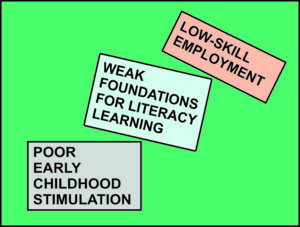Guiding Principles
Our work, both research and practice, rests on ideas drawn from broad trends in the literature, particularly in the behavioural sciences, anthropology, history and the cognitive sciences, as well as concepts that have emerged from our own research and experience. Rather than rushing in with “answers” we try to allow the context to guide our actions. We do believe that different questions would be best answered by different methods and that it may indeed be in the question that the answer could lie. Here we share some of the principles that guide our work.
Human Development as Non Linear

Rarely does life develop in a linear and sequential manner. In fact, it more often follows the path of a spiral. Over time, one returns to where one started, but perhaps in a qualitatively different manner: one is older and more mature. One can move from the path that one was a part of, onto a different path. Development rests upon previous development, a continuous elaboration, characterised by adaptation, discovery and renewal whereby one constantly learns from the past and looks to the future, all through one’s life.
Healthy development may not always point in the ‘forward’ and ‘up’ direction. New challenges may require a return to earlier learnings. It may also require the individual to let go of earlier positions and begin anew.
Individual Differences

While every individual is closely connected to his or her context and culture, every individual is unique, possessing special characteristics and features. This makes individuals different from each other. Our assessments therefore are not only based on normative comparisons, but also on the intra-personal frame of reference where the individual is his or her own standard for comparison. Rather than point to weaknesses, we seek to uncover the profile of strengths of each individual child. In this way we celebrate the person’s distinctiveness and create opportunities for this uniqueness to flower, blossom and find its place within the larger group.
Our interest therefore is not on the height of the curve, but rather on the shape of the curve,
Cultural Preparedness

A culture prepares its members to engage with life in a particular manner. The learning that occurs between an individual and his or her culture is not only the result of interactions with present members of that culture, it is drawn from a deep repository of experience that has accumulated and grown over the ages. An intervention developed in a certain culture may be necessary and sufficient for that context. However, the same conditions may be neither necessary nor sufficient for a people who have a different cultural heritage. Cultural Preparedness is a theoretical framework that has merged from our research over the years.
Promise uses the cultural preparedness approach as a framework for research as well as for the development of culturally resonant theorising and models of practice.
Social Cognitive Environments

Social cognitions are patterns of thinking that have become habitual across social groups creating unique social-cognitive environments. Social processes, ideological stances, belief structures and moral frames of reference engender mindsets that cause people to view life in certain ways. Our research has shown us that within these environments, certain behaviours maybe condoned while others are not.
For example a certain social-cognitive environment may promote a work ethic wherein some forms of work maybe attributed a higher level of prestige than others. Another example example would be home language and literacy environments which critically shape children’s literacy attainments.
Social- cognitive environments foster the development of attitudes which then guide and influence people’s behaviour.
Poverty is not only about Income Levels

Poverty has traditionally been understood in terms of inadequate income and low levels of consumption. But there are multiple facets to the experience of deprivation and quality of human development. Deprivation may be related to source of income and nature of employment, quality of health and nutrition, quality of dwelling, quality of education and the availability of a literate and regular earning member at home, and quality of empowerment. Seen through such a comprehensive lens we find that close to half of rural India experiences deprivation (Socio-Economic and Caste Census, 2011). Similar estimates of poverty apply to the urban poor. Thus addressing the needs of the child in poverty goes beyond merely addressing economic phenomena and extends to the social and psychological realities that attend this condition.
While acknowledging the economic dimension, Promise contributes to the reduction of poverty through interventions for literacy learning and support for career development and livelihood planning.
The Accumulation of Disadvantage
The youngest in poor communities experience the highest disadvantage that results from the conditions of poverty and deprivation.
Disadvantage could have a cumulative impact across the lifespan. Deprivation in cognitive stimulation and nutrition in the early childhood years creates a disadvantage in learning foundations almost at the outset. Impoverished primary and middle school environments could worsen learning skills disadvantages carried up from earlier years and manifest as educational failure. These deprivations could be further accentuated during the high school years, with the addition of loss of motivation, negative attributions, low self-efficacy and further lag in skills and knowledge. And finally the person would perhaps have no choice other than to take up low-skill work that keeps him or her trapped in the cycle of poverty.
Disadvantage, if not addressed, could have an accumulative effect across the lifespan.
![]() Promise Resources
Promise Resources
- The Child in the Community: Multiple Dimensions to Disadvantage.
- Arulmani, G. (2014). The cultural preparation process model and career development. In G. Arulmani, A. J. Bakshi, F.T.L. Leong & A. G. Watts (Eds.), Handbook of career development: International perspectives (pp. 81-104). New York, USA: Springer International.

